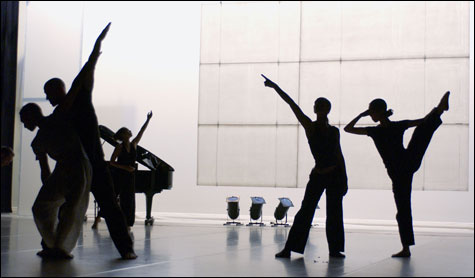
SLIGHTLY BROKEN: The simplest of the works that Contrapose presented were the most successful. |
Sporen, by the Dutch company Leine & Roebana, had two false beginnings before settling down to an hour of movement exploration. The company’s performances at the ICA last weekend completed CRASHarts’ dance offerings for the season. Leine & Roebana pushes the body to drastic extremes. The risk is all physical. Emotional implications stay safely under the control of the individual dancers, with sound and lighting effects spinning theatrical shocks and climaxes around them.
For 15 minutes or so, as the audience enters, dancers are casually strolling around the performance space, pausing to inspect us with long, wary stares. They seem to expect something of us, and they don’t have much hope of getting it. They don’t seem particularly eager to entertain us. They just accept this as a situation to be gotten through. I read this episode as a performance of the axiomatic neutrality and naturalness with which the postmodern dancers of three decades ago approached dancing.
Just as we begin to accept the idea of a no-win confrontation, we’re attacked by a sudden blackout of all the lights in the theater and a deafening crash.
When the stage lights go on again, the dancers are leaving and, in a soft glow to a soprano and lute song by Henry Purcell, an androgynous dancer (Tim Persent) begins a solo. The dance doesn’t have much to do with Purcell’s lament (“O Solitude”), but the audience is appeased and ready for Persent’s energetic gesticulating, spurts of bent-over locomotion, and occasional breakdance stunts. Through all his revolutions, he manages to face away from us most of the time.
His meditation, if that’s what it is, is rudely terminated by another explosion. In a strip of harsh light, a woman persistently wrenches her arm out of its socket, with screams and crashes hammering down on her, and us.
As the performance went on, these artificial jolts to the system subsided, and the movement continued in sets of extended variations on a few body challenges. A woman stood in place and swiveled her pelvis, letting her upper body rest above it. As the pelvic circles expanded and exaggerated, they propelled her arms out into space. Other women joined in this exercise, their torsos rippling and undulating quite unnaturally. Three men applied themselves to the same idea, emphasizing the chest instead of the hips.
The women pushed isolated body parts into unfamiliar directions. Groups of men and women threw a leg far out into space and followed the trajectory into running and broad-jumping. A woman in half a black dress (Marlene Wolfsberger) gestured and groped around herself, the rest of her body resisting the torque.
I noticed that in group sections, the seven dancers hardly ever moved at the same time. When more than two of them were dancing, the others weren’t present at all, or were standing and watching them. Alba Barral Fernandez stationed herself for a very long time, pointing upward with her head tilting over the extended arm while Ederson Rodrigues Xavier rushed and flailed around her.
Finally, in a harsh light, Fernandez was alone and wriggling very fast, almost out of control. A loud, electric version of a country guitar was playing, and the lights went out.